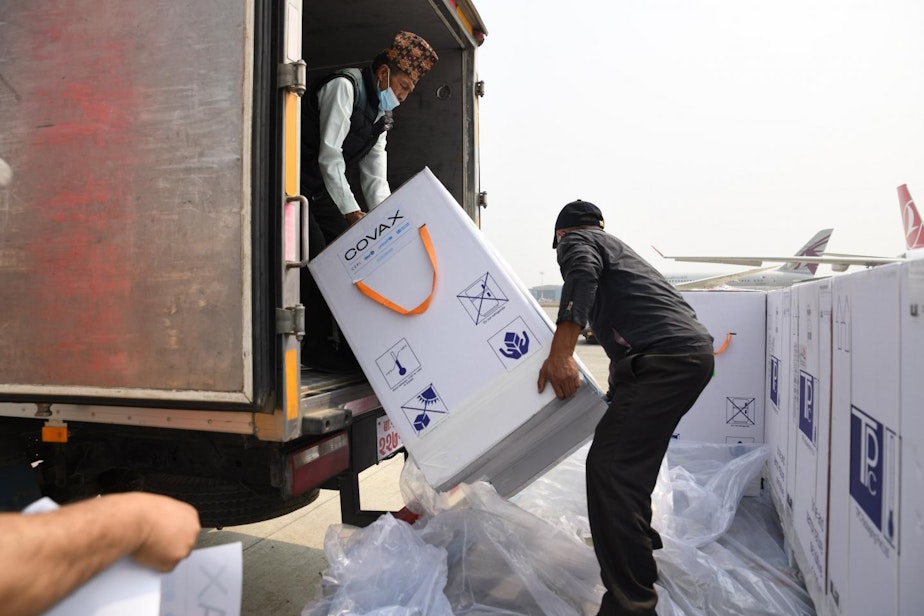Covid vaccines arrived a year ago. But global distribution remains a challenge

It was a year ago this week when the first Covid-19 vaccines began to roll out across the United States. One year later, the Centers for Disease Control says about 76% of eligible Americans have had at least one dose. That rate drops off a cliff when you look at the global population. The United Nations says low-income countries have just 8% of people vaccinated.
Why aren't we further along as the world heads into the third year of this pandemic? Dr. Lynda Stuart has been working on this. She's Deputy Director for Vaccines & Human Immunology at the Bill & Melinda Gates Foundation, which has committed more than $200 million to the global initiative known as COVAX.
This interview has been edited for clarity.
KUOW’s Kim Malcolm spoke with Dr. Stuart about what needs to happen to close this global vaccine gap.
Dr. Lynda Stuart: For the current pandemic, we need to continue to make vaccines and make them fast. We need to make them available, and we need to really focus on delivering those vaccines to people. We anticipate in 2022, we may well have a lot of supply, and the bottleneck will be actually getting those vaccines into the arms of people.
For future pandemics, we absolutely need to sort out the manufacturing and make it more equitable. I think we need to increase the number of countries that can manufacture vaccines, as well as the number of doses that they can manufacture. It really is distributing the technical capability globally.
Kim Malcolm: What are you and your colleagues at the Gates Foundation doing to solve this problem?
Sponsored
In our current paradigms for how we make vaccines, it's this very sort of antiquated process, these big vats of vaccine fermenters, if you can imagine. That's how we used to do it in the old day. In the modern era, the mRNA vaccines really allow us a totally different way of thinking about how we manufacture a vaccine. In future pandemics, I'm really hopeful that that type of technological breakthrough will make it much easier.
The reason mRNA is different or better, is it really requires a much smaller facility that can still make millions of doses. It's almost something you could put in a box. That really will help us distribute the manufacturing capacity to different manufacturers around the world. That's one of the things we're doing for the future. For now, we are still working to enable and empower the developing country vaccine manufacturers that have capacity to work now. We're really trying to facilitate them to make as many doses as they can and distribute those doses throughout the world.
You spoke at TEDx Seattle recently. You were talking about access to vaccines and how it has become perhaps the ultimate marker of the haves and the have nots. Is there still time to turn this around?
I'm eternally optimistic. I think we learn from every time we do this. We do it faster. We learn quicker. The scientists, for instance, in South Africa, identified and determined the phenotype of the current omicron variant within literally days. Three years ago, this would have taken us weeks or months.
I do think we're seeing now that we are, more than anything, a globally connected community, and that we cannot get out of this unless we're all out of this. The phrase we often use in our team is, nobody's safe until everyone's safe. I think that message is coming home very loud and clear to people. I think with that we will focus more on the equity issue, at least that's my hope.
Sponsored
What do you want people to be aware of as you look to the future?
We are pretty sure that variants will emerge again. One of the things that a lot of scientists are now beginning to explore is how we can make variant-proof, or broadly protective vaccines that will essentially protect us from the current and existing variants, but also protect us from variants that emerge in the future. I think this is going to be really important because this will mean that instead of having to vaccinate people every time a new variant comes along, which is clearly a challenge with seven billion people on the planet, is that we will be able to vaccinate people once, and really cover both present and future threats. That's my hope, that we can invent one of those for the globe.
Listen to the interview by clicking the play button above.





